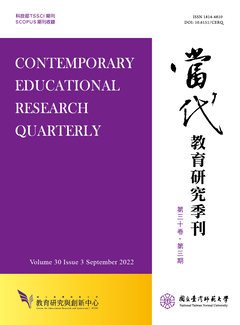

研究目的
本研究旨在探討《中華民國教師專業素養指引—師資職前教育階段暨師資職前教育課程基準》實施後,師培機構在師資職前課程是否做出相對應的改變及變革過程中所面臨的挑戰、問題與因應策略。
研究設計/方法/取徑
本研究採立意取樣方式,依學校所在區域、學校類型就40所中等師資培育機構抽取一半,並以其機構主管及課程承辦人員為對象,合計40位,進行半結構式訪談。
研究發現或結論
研究原創性/價值
本研究以20所中等師資培育機構之觀點,探討各師培機構的實施作法、問題以及因應策略,有助於檢討此次變革的實施現況,並彙整相關因應策略與建議供師培機構端或是主管機關政策修正之參考。
Purpose
This study examines whether teacher education institutions have made curriculum changes conforming to Taiwan (R.O.C.)’s policy document “Guidance for R.O.C. teacher professional competence- Standard for pre-service teacher education curriculum”. This study also investigates the challenges, and coping strategies experienced by institutions in the process of implementing the policy.
Design/methodology/approach
Through a purposive sampling, we selected 20 secondary school teacher education institutions (out of the 40 institutions in Taiwan) based on the regions and the characteristics of the institutions. Accordingly, 20 directors and 20 administrative staff from these institutions were interviewed in a semi-structured manner.
Findings/results
1. There were varying levels of commitment to the curriculum reform in the teacher education institutions. The keys to the full implementation of the curriculum change were the leadership of supervisors, the commitment of teachers, the guidance for students, and the supplementary measures for screening and selection.
2. The teacher education institutions generally disagreed an element of the policy, that of an "increase or decrease of the minimum number of credits for each professional course category", most notably the requirement of the number of credits for practical courses and the elimination of field service hours.
3. In the process of implementing the policy, teacher education institutions experienced challenges and difficulties at administration, teacher, and student levels. We observed that some institutions developed their own coping strategies.
4. These challenges at administration, teacher, and student levels forced challenges for each institution that varied depending on their characteristics.
Originality/value
1. Previous studies investigated single-school cases in terms of experience sharing and scholarly critique. Although there is one empirical study, there is still a lack of empirical literature from the perspective of teacher education institutions.
2. This study examines the implementation methods, problems, and coping strategies from the perspectives of 20 secondary school teacher education institutions, which gives a broader perspective of the status of the implementation of this curriculum reform, and compiles relevant strategies and suggestions as a reference for teacher education institutions and government authorities for policy revision.

This work is licensed under a Creative Commons Attribution-NonCommercial 3.0 Taiwan License.
Center for Educational Research and Innovation, National Tawain Normal University
162, Ho-Ping East Rd, Sec. 1, Taipei, Taiwan | Tel:+886-2-7749-3670 | E-mail: cerecerq@gmail.com
CERI | NTNU | E-mail Alerts | Open Journal System
© 2014 CERI-NTNU
